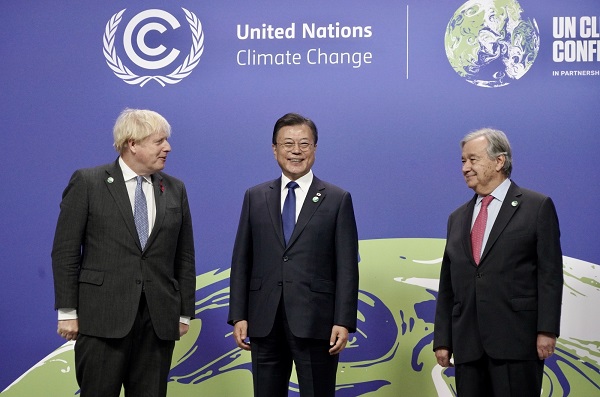Glasgow, (Samajweekly) South Korean President Moon Jae-in has officially declared his country commitment to cut greenhouse gas emissions by 40 per cent from the 2018 levels by 2030 as he addressed the annual UN climate conference.
Moon also said South Korea will try to bring carbon emissions down on the entire Korean Peninsula by pushing for tree planting campaigns in North Korea during a keynote speech at the 26th Conference of the Parties (COP26) in Glasgow on Monday, reports Yonhap News Agency.
South Korea’s reduction target represents a sharp raise from its previous goal of 26.3 per cent.
“This is a bold objective that was raised by about 14 per cent from the previous target,” Moon told the climate summit that brought together more than 100 heads of state, including US President Joe Biden and UK Prime Minister Boris Johnson.
“This is a very challenging task of having to reduce greenhouse gases steeply in a short period of time,” Moon told the world leaders.
“It is not an easy task, but South Korea has decided now is the time to act.”
Last month, South Korea finalised the decision to reduce emissions by 40 per cent from 2018 levels by 2030. The country also confirmed that it will achieve carbon neutrality by 2050, as the nation started tackling the challenge of responding to climate change and attaining sustainable growth simultaneously.
“Following the inauguration of our government, eight coal-fired power plants were shut down. By the end of this year, two additional plants are scheduled to close. We will put a complete end to coal-fired power generation by 2050,” Moon said.
“Moreover, official financial support for the construction of new coal-fired power plants overseas has already been suspended.”
Moon also formally announced South Korea’s decision to join the Global Methane Pledge, a global pact to cut methane emissions by 30 per cent by 2030.
“We will reduce greenhouse gas emissions on the entire Korean Peninsula through forestry cooperation between the South and North Korea,” Moon said.
North Korea is known for severe deforestation due to excessive logging for fuel, which has been blamed for flooding and many other natural disasters.









